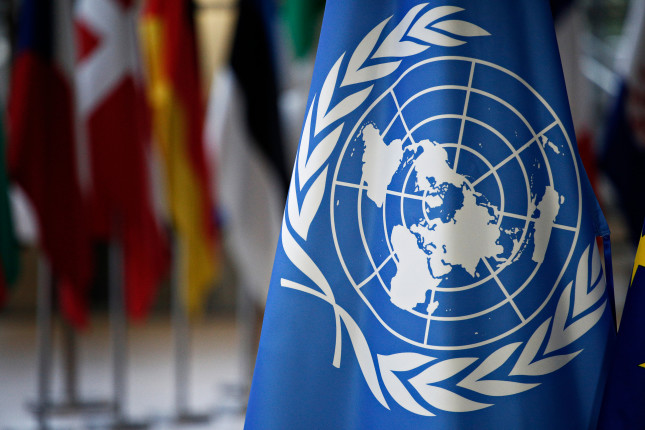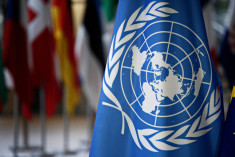-
To Address Climate Risks, Advance Climate Security in the United Nations
 Climate change is widely recognised as one of the major forces shaping the future. Climate impacts illustrate in stark clarity how human actions fundamentally affect the basic physical processes of the planet with vast and, in the worst cases, disastrous consequences for communities around the world. Given these profound impacts, climate change is increasingly treated as a security risk. As a changing climate is causing and will continue to cause diverse impacts across the globe, the associated security challenges are multifaceted. They involve human, community, state, and international security risks, and will require responses across all levels of decision-making, from the local to international.
Climate change is widely recognised as one of the major forces shaping the future. Climate impacts illustrate in stark clarity how human actions fundamentally affect the basic physical processes of the planet with vast and, in the worst cases, disastrous consequences for communities around the world. Given these profound impacts, climate change is increasingly treated as a security risk. As a changing climate is causing and will continue to cause diverse impacts across the globe, the associated security challenges are multifaceted. They involve human, community, state, and international security risks, and will require responses across all levels of decision-making, from the local to international.
Climate change is widely recognised as one of the major forces shaping the future. Climate impacts illustrate in stark clarity how human actions fundamentally affect the basic physical processes of the planet with vast and, in the worst cases, disastrous consequences for communities around the world. Given these profound impacts, climate change is increasingly treated as a security risk. As a changing climate is causing and will continue to cause diverse impacts across the globe, the associated security challenges are multifaceted. They involve human, community, state, and international security risks, and will require responses across all levels of decision-making, from the local to international.
Over the past decades, climate-related security risks have increasingly influenced policymaking in divergent areas. The most detrimental climate impacts are currently felt in societies affected by conflict and weak governance. While the debate continues on the precise mechanisms linking climate change to violent conflict, the fact remains that many peace operations are located in areas with high exposure to climate change. This fact illustrates the intersection of challenges, and points to a need to integrate climate risks into peacebuilding efforts and conflict-sensitivity into climate responses. In the United Nations (UN), the UN Security Council has a mandate for maintaining peace and security. So how is the UN Security Council developing its responses to security risks posed by climate change?
Over the last decade, the UN Security Council has gradually incorporated climate change into its agenda, despite skepticism from some member states. While a presidential statement called for “contextual information” on the potential security implications of climate change in 2011, it was 2017 before a concrete step was taken with the adoption of Security Council Resolution 2349 on the Lake Chad Basin. In the resolution, the Security Council recognizes that climate change is shaping the peace and security landscape in the region, and that there is a need for adequate risk assessment and risk management strategies. Thereafter, a handful of UN Security Council Resolutions have repeated these statements, incentivising the UN system to develop the capacity to deliver such risk assessments.
Some modest institutional changes have also taken place. To begin strengthening the capacity to assess climate-related risks, a Climate Security Mechanism was established in October 2018, and is hosted by the UN Department of Political and Peacebuilding Affairs with staff support from the UN Development Programme and the UN Environment Programme. Simultaneously, proactive UN member states have worked with like-minded states to create a Group of Friends on climate security, providing a locus for advocacy of the climate security agenda in the broader UN system.
Progress in the Security Council has served as a strategic confidence-building process for climate security across the UN system, but to adequately address climate risks, more work is needed. Through our research at SIPRI, we identified three priority areas for future action. The first step is for the UN to deliver results in the field. By working through existing entry points, climate impacts and vulnerability should be integrated into existing risk assessments and risk management strategies. Most of this work is preventive, which includes early warning, adaptation, mitigation and mediation, and ultimately serves to strengthen human security.
Second, leverage the Climate Security Mechanism to act as a broker between the UN system and the research community. Knowledge on how, when, and why climate-related security risks arise is developing rapidly in research and policy. Collaboration across different domains will enable the identification of efficient and effective responses. To tailor adequate responses, the analyses need to be context-based and encompass system complexities. This will require research informed policy innovation that the Climate Security Mechanism is well-placed to facilitate.
Third, integrate climate security into existing funds that focus on, for instance, climate adaptation and mitigation, peacebuilding, and disaster risk reduction. The systemic character of climate-related security risks makes financing a challenge. Funding is often siloed, which hinders integrated responses.
Committed actors and long-term investments will be required to ensure the feasibility of each step. The recent developments in the UN system demonstrates that collaboration among dedicated member states can have an impact—despite opposition from some—on processes of institutional change. With escalating climate impacts, the mitigation of climate-related security risks by the UN and member states is not only demanded and feasible, but urgent.
Malin Mobjörk, PhD, is a senior researcher and the Director of the Climate Change and Risk programme at Stockholm International Peace Research Institute (SIPRI).
Karolina Eklöw, is a research assistant in the Climate Change and Risk programme at Stockholm International Peace Research Institute (SIPRI).
Sources: Security Council Report, Stockholm International Peace Research Institute, WIREs Climate Change
Photo Credit: Photo via Shutterstock. All rights reserved.
 A Publication of the Stimson Center.
A Publication of the Stimson Center.

 Climate change is widely recognised as one of the major forces shaping the future. Climate impacts illustrate in stark clarity how human actions fundamentally affect the basic physical processes of the planet with vast and, in the worst cases, disastrous consequences for communities around the world. Given these profound impacts, climate change is increasingly treated as a security risk. As a changing climate is causing and will continue to cause diverse impacts across the globe, the associated security challenges are multifaceted. They involve human, community, state, and international security risks, and will require responses across all levels of decision-making, from the local to international.
Climate change is widely recognised as one of the major forces shaping the future. Climate impacts illustrate in stark clarity how human actions fundamentally affect the basic physical processes of the planet with vast and, in the worst cases, disastrous consequences for communities around the world. Given these profound impacts, climate change is increasingly treated as a security risk. As a changing climate is causing and will continue to cause diverse impacts across the globe, the associated security challenges are multifaceted. They involve human, community, state, and international security risks, and will require responses across all levels of decision-making, from the local to international.

